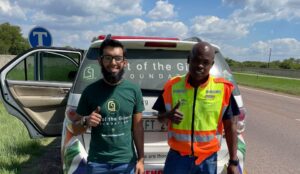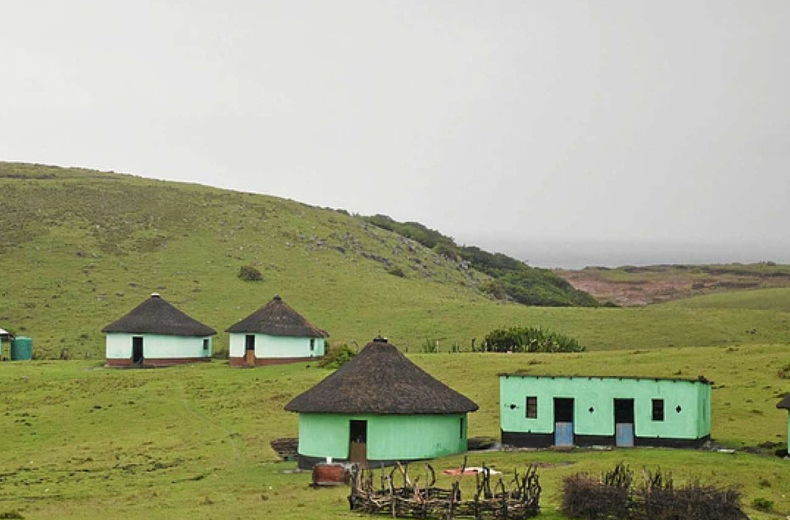27-year-old Uzair Bhamjee is a passionate cyclist and mental health activist. [Picture: Supplied]
When the people around him said he wouldn’t achieve more than a matric certificate, if he was lucky, Mohammed Uzair Bhamjee said no. Today, the 27-year-old cyclist graduated with a Masters degree in one of the toughest fields, and he remains committed to making the world a better place.
He’s not your typical activist. He doesn’t wear a cape or a mask, nor does he spend his days picketing outside government buildings. But make no mistake, this unassuming young man lives his days in service to others.
Born and raised in the hinterland town of Middelburg, Mpumalanga, Uzair has grown from someone whose teachers thought he wouldn’t go far, into someone who betrayed the odds against him. In him burns a fierce passion for empowerment.
“I always had a passion for helping people. From a really, really, really young age, I was involved in various organisations’ community projects,” he said.
Growing up in an Indian community of a dorpie in the province of the rising sun helped expose him to all the biases that come with small town closed-mindedness. Be it a slight from a teacher or negative attitudes and generalisations, he found some of these injustices “damaging”.
“When you see so much inequality happening, when you see people being stereotyped based on their family lineage, based on the work their parents do, it’s upsetting to a large extent. When that actually influences the level of education you receive, that is really damaging to an individual.”
But rebelling or quitting were not options for him. Instead, Uzair puts foot to pedal and grunts out his frustration in the 100km cycle from town to Loskop Dam and back. “By me looking at it and having no idea how to deal with some of those injustices, because I was directly affected by it, I then explored ways to understand what is going on and how to work with it.”
An unlikely achiever

Today, Uzair holds undergraduate and postgraduate degrees in Psychology from North West University. Just a couple of weeks ago, he completed his Masters in Psychology, after several years of dedicated effort. This was the same guy whose teachers didn’t think he could do it.
“A teacher’s role is to motivate a student, to encourage them, to help them through, not only difficulty with their school work, but to get them the help that they need. That is their responsibility and if they cannot help you they can at least refer you. Unfortunately, they aren’t doing that.”
Young, confused and deflated, he needed to find a way to deal with the pressure. He consulted an aalim [Muslim scholar]. He spoke to his fellow cyclists. It was clear he needed to see a counsellor. But Muslim psychologists are hard to come by in South Africa! That’s when he decided to get lost in research and began contemplating a career in the field.
“I’m good at business and I can do it. But apart from doing business and giving money – anyone can do that – how many people are willing to give their time?”
Pursuing a degree in psychology, as anyone who has ever tried it in South Africa can attest, is no joke. Spaces are limited and it takes a long time. No surprise, then, that Uzair counts this among his greatest achievements.
But his biggest accomplishment by far was memorising the Qur’an from cover-to-cover, in what is known as Hifdh. This he began at the age of 13 and completed three years later, after many late nights and early mornings.
“It takes a lot of dedication, sacrifice, early mornings, late nights,” he said. It took great discipline to remind himself what he was trying to achieve, especially “when you see other people going out to play soccer and you know that you’ve go to learn that one page of your sabaq”.
SMread: Ramadan an opportunity to promote social justice
Religion and psychology
For people from Uzair’s background, psychology can be a tricky subject. Although he describes his parents as “chilled out people”, the stigma associated with mental health issues within the Muslim Indian community, coupled with a sceptical perspective on studying psychology as a Muslim, means anyone who pursues it is likely frowned upon.
“Quite a few members of the community, when you tell them I’m studying psychology, they look down upon you. The first thing they’d say is, ‘Oh, you’re going to work on the mad people, it’s a nonsense profession’.”
But, Uzair consulted reputable ulema around him and decided to pursue it. He soon learnt that the idea of psychology being contrary to Islam could not be farther from reality!
“Those aalims said there is definitely a need for it. However, just remember that you’re a Muslim first. So that was always at the back of my mind. A lot of the things that I discovered were from, you know, Imam Ghazali,” he said. “From the English bits that I’ve looked at, so much has to do with psychology. It’s like a circle.”
Uzair now understands that the interconnected nature of the mind, body and soul – in Islamic as well as western literature – can be used to improve one’s life holistically. This was how he found his purpose.
“My contribution was to help individuals think critically to understand the purpose of why they are doing what they are doing. It’s not just about going out for three or forty days, it’s about understanding the deeper meaning behind it; what does it do and how does it impact your life.”
“When understanding this holistically, if your mind is not right, how are you going to achieve that concentration in salaah? How are you going to achieve that perfect prayer if your mind is not right?”
SMread: Solutions to Johannesburg’s water crisis
Empowerment

Uzair knows he has a purpose to fulfil in this world. He finds it most fulfilling to work with people from various backgrounds, even though it takes a laborious effort, through empowerment projects led by the Gift of the Givers Foundation.
Every so often, he must catch a flight to the Eastern Cape province. Six hours after arriving at the East London airport, he finds himself at a far-flung rural school. He finds himself in the underdeveloped, disconnected quarters of South Africa’s most impoverished province.
Two hours and hundreds of pupils later, he must drive all the way back along the dusty gravel roads that reluctantly permit the passage of a 4×4, much less a normal car.
“It’s really difficult to keep a balance at times because the work that I’m doing is such where I work in vulnerable communities; communities that don’t have water, that don’t have electricity, that don’t have basic roads.”
Coming home “dead tired” after a long day of work, Uzair is grateful to return to a supportive wife. Fortunately for him, she understands his erratic schedule. But people need to be empowered, he said, no matter the sacrifice.
A common theme in underprivileged communities, Uzair encounters many children whose eyes shine bright with potential. Yet they were born into a system that denies them access to these opportunities, even if they were self-aware of their potential.
“How long can we sustain people without empowering them? There are several learners that have the ability and the potential to actually do something with their lives but they don’t know how they can do it.”
For this, he has much ire for the present government. “It’s been so many years since apartheid yet they’re living in conditions as if they were in apartheid; the only difference is that they have freedom. They can go wherever they want and they have access to education, but the access they have to education is not skilling them in any way,” he said.
“When we look at empowering a learner, we need to empower them by empowering their minds first.”
For his internship, Uzair took up a post in the military in 2022. Asked about that experience, his immediate response was “Yoh!” before he went on to describe it as “a truly uplifting experience” and “arguably one of the best internships in the country”.
Out of around 100 applicants, he said, only four make it into the internship.
“I could understand who I am and what I’m doing, and how I could do it to the best of my ability. The exposure I’ve gotten at the military, I doubt many have gotten.”
Away from the gruelling work of studying psychology and participating in empowerment initiatives, Uzair is happy to “do nothing” in whatever free time he’s left with. But he also enjoys spending time with family and visiting people, if he’s not cycling.
“I enjoy the outdoors and visiting people. My wife thinks I’m mad, but wherever I visit I know people. I would pop in to say hi, I have to do that.”
“I enjoy sometimes just resting and doing nothing, but the thing I really enjoy is spending meaningful time with those that I love. My wife, my family and my in-laws – with those people, I talk a lot of nonsense and I’m fine with it.”
